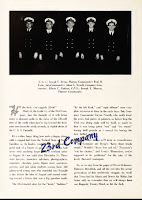V-MAIL
438th AAA AW BN
APO 654 % Postmaster, N.Y.
England
4 June, 1944 0810
Dear Sweetheart –
It’s rather early for a Sunday morning but we have to get up for calisthenics on Sunday too – only one hour later. I have a busy day coming up – but most of the morning is free and I’m going to try my best to play a round of golf with one of the other officers. Something had always turned up to prevent it – and there won’t be much more opportunity. After all, darling, I must be able to say I played golf in England.
There is nothing new at all to report from here – everything just moving along normally except for the mail situation which has deteriorated. I could go to London on business tomorrow – for the day – but I’m letting someone else go in my place. It’s quite a ride and I’ve seen enough of London so far. That’s all for now, sweetheart. Will write more later. Love to everyone at home and
All my love to you, dear
Greg
* TIDBIT *
about The Prelude to the Invasion
and Invasion Stripes
about The Prelude to the Invasion
and Invasion Stripes
After a long day of discussions with his commanders General Eisenhower finally gave the order on Sunday 4 June 1944 at 21.45 hrs for the invasion to go ahead. He was standing outside his headquarters at Southwick House in Hampshire, it was still pouring with rain, but a break in the weather was expected for Tuesday, 6 June, 1944 and this was now the date set for D-Day. In all, 47 Allied Divisions would be committed to take part in the Battle of Normandy: 26 British, Canadian, Commonwealth and Free European troops, and 21 American Divisions.
Earlier in 1944, by means of a top secret Operation Memorandum Number 23, entitled “DISTINCTIVE MARKING – AIRCRAFT", an order had been issued to all USAAF and RAF aircraft units in anticipation that the German Luftwaffe would respond in great strength during Operation Overlord (D-Day landings). The order was effective 11am, Sunday, June 4th , 1944, and stated that no aircraft were to fly without Allied Expeditionary Air Forces Special Markings, known as Invasion Stripes. This order was the result of a profound fear that allied aircraft would be mistaken for the enemy by the Allied ground troups, Navy and Air Force. Experience during the landings in Sicily learned that distinctive markings greatly reduced the number of so-called “friendly-fire accidents”.
The markings consisted of five alternating 18-inch wide stripes (white/black/white/black/white) around the rear fuselage and around each wing. The stripes on the wings were to be 15 inches wide. On the wing, the outer white stripe was to be 6 inches from the national insignia. On the fuselage, the edge of the rearmost stripe was to be 18 inches from the leading edge of the tailplane, but the stripes should in no case obscure the national marking.
The outer white stripes obliterated most of the individual aircraft letter and the second letter of the squadron code. In some cases they were painted around and in others reinstated. After invasion, the stripes were found to compromise camouflage. Therefore, on July 6th, 1944 The U.S. 8th Air Force started removing upper stripes and many other units followed suit, though no order from SHAEF has been found. On August 1st, 1944 Amendment 3 (to Operational Memorandum 23) ordered all wing stripes removed from August 25th onwards. Fuselage stripes were to remain intact. Many units removed the upper fuselage stripes at this time in a "liberal" interpretation of the order.
In December, the remaining portion of the markings on the underside was to be deleted by the last day of the year.
Earlier in 1944, by means of a top secret Operation Memorandum Number 23, entitled “DISTINCTIVE MARKING – AIRCRAFT", an order had been issued to all USAAF and RAF aircraft units in anticipation that the German Luftwaffe would respond in great strength during Operation Overlord (D-Day landings). The order was effective 11am, Sunday, June 4th , 1944, and stated that no aircraft were to fly without Allied Expeditionary Air Forces Special Markings, known as Invasion Stripes. This order was the result of a profound fear that allied aircraft would be mistaken for the enemy by the Allied ground troups, Navy and Air Force. Experience during the landings in Sicily learned that distinctive markings greatly reduced the number of so-called “friendly-fire accidents”.
The markings consisted of five alternating 18-inch wide stripes (white/black/white/black/white) around the rear fuselage and around each wing. The stripes on the wings were to be 15 inches wide. On the wing, the outer white stripe was to be 6 inches from the national insignia. On the fuselage, the edge of the rearmost stripe was to be 18 inches from the leading edge of the tailplane, but the stripes should in no case obscure the national marking.
The outer white stripes obliterated most of the individual aircraft letter and the second letter of the squadron code. In some cases they were painted around and in others reinstated. After invasion, the stripes were found to compromise camouflage. Therefore, on July 6th, 1944 The U.S. 8th Air Force started removing upper stripes and many other units followed suit, though no order from SHAEF has been found. On August 1st, 1944 Amendment 3 (to Operational Memorandum 23) ordered all wing stripes removed from August 25th onwards. Fuselage stripes were to remain intact. Many units removed the upper fuselage stripes at this time in a "liberal" interpretation of the order.
In December, the remaining portion of the markings on the underside was to be deleted by the last day of the year.

















